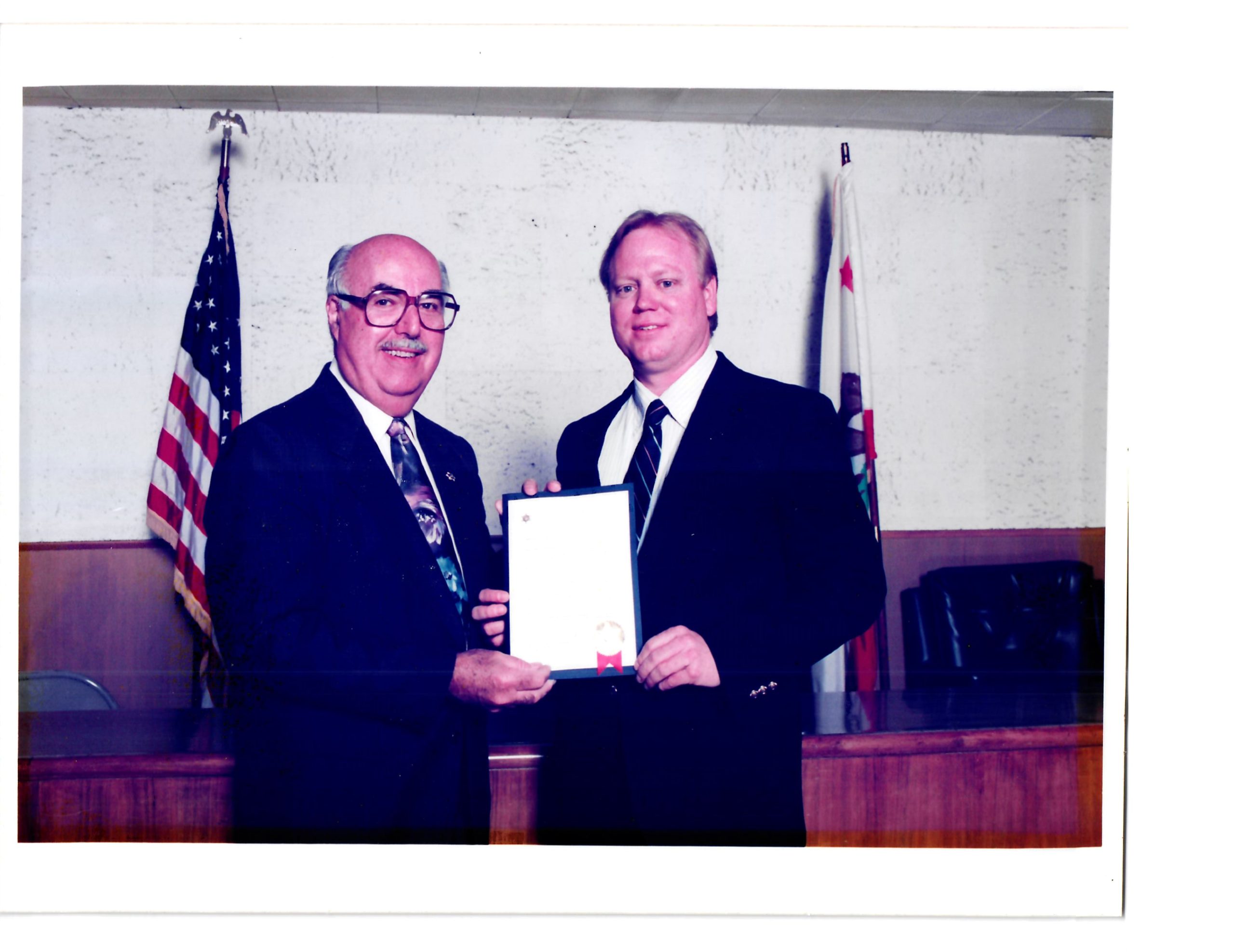The following article “JUSTICE DELAYED” is number THREE in a series of real-life experiences taken from the manuscript of retired Deputy Dale Hedges, titled, “Damage Control,” which documents his time with the Los Angeles County Sheriff’s Department.
In this article, the investigation into August Hoffman takes an incredible series of twists and turns. Dale and his partner soon come to realize that they simply cannot trust anyone, including executives on the Department at the highest level.
JUSTICE DELAYED
When continuing our interview with August Hoffman, I asked him to tell me about Deputy Brian Wines and his relationship with him. I believe Hoffman thought he was telling me a story I already knew or had heard. Once again, he seemed unconcerned with any type of repercussions for his actions, as he didn’t seem to hold anything back as he spoke. Maybe Hoffman felt this way because of the amount of time that had gone by, or maybe because he realized the Sheriff’s Department and the top management of the Sheriff’s Department had been hiding this for years. He never seemed worried about prosecution.
Hoffman said he had first met Brian Wines and his wife some months after Deputy Wines had been diagnosed with Multiple Sclerosis (MS). Hoffman said Brian and his wife had recently gotten married and while on vacation, Brian had gotten ill. He went to a hospital where he was diagnosed with MS.
I never knew the exact facts of Brian’s illness, because as I said earlier, that type of information is never out publicly. But Hoffman continued by saying, as Brian’s illness progressed, Brian became despondent and more and more depressed. At one point his fellow SWAT team members at the Special Enforcement Bureau were so concerned about him and his depression that they came to his home and removed what they thought were all his firearms.

Brian and his wife had decided to seek help at Psychological Services where they were referred to one Psychologist, Doctor August Hoffman. Hoffman said he began seeing and counseling the two together for a few months, but as he became more smitten with and attracted to Brian’s beautiful wife, who was a nurse, he once again decided he wanted to see and counsel them separately. They of course agreed, so with his eye on the prize, August Hoffman began once again manipulating his prey, grooming the wife of Deputy Wines.
Hoffman admitted after meeting Mrs. Wines he wanted to be alone with her and slowly began to work to build her trust. He felt that in his position as her psychologist, he could groom her into looking up to him and then manipulate her. After seeing the two separately for a comfortable period, he began calling Mrs. Wines at her work to “check up” on her, then sending flowers and gifts to her place of work. Then without warning, he began to show up at her place of work in the afternoons and took her to lunch, of course to, “discuss Brian’s issues with her.”
As Brian’s wife became more comfortable with Hoffman and he felt she was ready, he said he made his move and began pursuing an affair with her. His own admission to us during this interview was that during this affair, Deputy Wines had somehow discovered what was going on between Hoffman and his wife. According to Hoffman, this affair unexpectedly pushed Brian over the edge, causing him to commit suicide. This was a stunning admission. He stopped seeing Mrs. Wines after the suicide when she, in her time of grief, stopped responding to Hoffman’s advances.
Hoffman related that he had begun to get worried and nervous about the prospects and likelihood of getting caught at this point. Especially after Deputy Wines’ suicide and the pregnancy of Lieutenant Gable’s wife. Hoffman worried that with the suicide of Deputy Wines, there was always a chance his wife might, out of guilt, file a complaint against him, causing him huge concerns for his affair with her. Couple these two incidents with the fact that Dr. Audrey Honig, the then head of Psychological Services, had only given him the two years to produce his credentials and diplomas.
Hoffman said he clearly could not produce credentials he didn’t have, so with all this in mind and his paranoia building, he decided he would be better off resigning and returning to his job as a deputy sheriff before he was discovered. With his two-year window ending soon at Psych Services, and worried about getting caught up in scandals, he decided to resign his position and return to the Department as a deputy sheriff. His only hope was that by leaving, no one would consider looking into his actions any further or know about his lies. He quietly resigned his position as a psychologist and was reinstated as a deputy sheriff, where he was assigned to the early morning shift at the Inmate Reception Center (IRC), processing inmates into and out of the various custody facilities. He felt like he was home free.
According to August, it was not long after he returned to the Sheriff’s Department as a deputy, in fact only a very short time, when he received surprise a visitor at the Inmate Reception Center. Early in the morning hours of his shift, before he was to get off work, Undersheriff Jerry Harper, the second in command of the Los Angeles County Sheriff’s Department under Sheriff Sherman Block, personally showed up at IRC, where he took now Deputy Hoffman aside. Hoffman described the visit as extremely uncomfortable and Undersheriff Harper was clearly confrontational towards him, he knew his deception was over.
Harper took Hoffman into a small room and got very close to his face. Clearly angry, Harper told him directly and in no uncertain terms that he and the Department knew that Hoffman had lied to get the job at Psychological Services. He made it clear that the Sheriff’s Department knew about the suicides under his, Hoffman’s, care, and the affairs August had had with his patients. Harper told Hoffman he only had two options, resign from the Sheriff’s Department now and go away, or Harper would have him charged, convicted, and imprisoned. August chose to resign.

I inquired to Hoffman if he had known Undersheriff Harper prior to that time. He claimed the Undersheriff was well known by himself and everyone at Psychological Services. He was a regular visitor at the bureau, where he would come to visit the head of the unit, Dr. Audrey Honig. This information was confirmed by employees of Psychological Services, but Harper’s relationship with Honig was not part of the investigation. Hoffman claimed Honig and Harper were known to be “a couple” and involved in a relationship. He said it was well known in that Department that the relationship with Harper had helped Honig get the job as Head Psychologist. Hoffman also said it was rumored that Honig and the Undersheriff had a child together but didn’t expand on that comment. Again, this relationship and child were never confirmed, investigated, nor was it an issue, but it did raise or possibly answer the questions as to who and why an agency as large as The Los Angeles County Sheriff’s Department might want to protect itself and high-ranking employees from a massive scandal and why they might want Hoffman to simply go away quietly.

After all that happened with Hoffman, the Psychological Services Bureau and Sheriff’s Department seemed to have just swept the entire matter away under the rug, sweeping away the victims along with it. If Hoffman’s version of these events were true, it seemed obvious there was possibly a cover up of a massive criminal matter at the very least by Dr. Honig and Undersheriff Harper. Who else could want this series of events to go away, did it even go higher? Clearly Hoffman knew after the years went by, or at least thought he had gotten away literally with murder. He was so cocky and arrogant in this interview, he must have believed that to keep it hidden this long, the Sheriff’s Department would never allow him to be prosecuted. I wanted to change all that.
Filing the charges against August Hoffman for embezzling his badge was a no-brainer. We also booked him for filing a false police report regarding the loss of his badge. But his interview had opened an entire pandora’s box of possible new charges. What was still odd to both Sylvia Smith and I, was August Hoffman’s willingness to waive his Miranda Rights and tell us about his time at Psychological Services, something we knew nothing about prior to the interview. Here we had someone who not only openly and admittedly impersonated a Doctor of Psychology but did it while working in a high-profile position within the Los Angeles County Sheriff’s Department.
August, with very little questioning by us, had admitted that while he held the position, he had been personally responsible for the suicides of at least six deputy sheriffs under his care. Once again, we asked ourselves the same questions, who knows how many more may have committed suicide later or how many others suffered job performance issues, divorce’s or were fired because they received inadequate psychological treatment when they needed it most. Plus, on top of it all, for me personally, there was Brian Wines and his suicide, which made it all the more personal for me.
What made the Sheriff’s Department so unwilling to do the right thing and prosecute Hoffman? A prosecution which seemed easy and in the bag for even a novice detective and to get justice for the victimized deputies involved. These were clearly horrible crimes that screamed out for prosecution and justice for his many victims. I made a personal promise to myself that I wanted Hoffman to go down for his crimes. He needed to be in prison, paying for the loss of lives and livelihoods lost while working as a fake and fraudulent doctor.
The county needed to do the right thing and make victimized deputies and their families whole again. August Hoffman should not be allowed to be free and out on the streets where he obviously felt bullet-proof and untouchable for some reason. Hoffman clearly felt like nothing was going to happen to him for all he had done. The biggest question was for the Sheriff’s Department to answer, really for Assistant Sheriff Jerry Harper to answer. WHY??
It took us some time to do the follow-up investigation to confirm August Hoffman’s time on the Sheriff’s Department as well as the transfer and time at Psychological Services. All the information he had given was hard to believe and had to be confirmed or dispelled to build a criminal case. It is difficult not to hit a dead end in this type of investigation. As badly as I wanted to file charges Immediately, I needed actual evidence other than just his words. I contacted Psychological Services where, without telling them what I was investigating, I attempted to get information about August Hoffman and his time working there. Of course, that met with a dead end and during each call I was told they could neither discuss Dr. August Hoffman, nor any of the cases surrounding Dr. August Hoffman.
I needed something to either confirm Hoffman’s story as true or not true. Although I did get some off-the-record confidential information confirming Hoffman’s story, I decided to see if I could get permission to look at August Hoffman’s Department personnel jacket to see what information it might hold. These personnel records are kept in a secure area called “The Vault” and access is very limited and by permission only. I decided to contact a man I knew well, Assistant Sheriff Dick Foreman, for help. I called the Assistant Sheriff and explained my investigation. I asked if I could get permission from him to review Hoffmans personnel file in the Vault to look through it for anything that I could use for evidence. Assistant Sheriff Foreman gave me his permission and cleared the way for me at the Vault.

Two days later I drove downtown to visit the Vault where I asked for the personnel file of Deputy August Hoffman. Minutes went by until the deputy working at the Vault advised me the personnel file had been checked out and had not been returned. I asked who might have it and where it was. The deputy showed me a logbook entry signed at the time the folder was removed. There was no date or any indication of which unit the folder was taken to, the log entry simply said, “Sgt. Miller,” with no further details, no employee number, no unit, no date. It seemed it had disappeared.
The Vault deputy was confused and seemed a little concerned about the situation. He had no answer as to how anyone could remove a personnel jacket from that secured area without properly signing it out. I left empty-handed. Puzzled, the following day I called Assistant Sheriff Foreman, advising him of what had happened at the Vault. He talked to me for a few moments expressing some surprise and said, “give me a couple of days Dale, I’ll get back to you when I locate it.” Two days later the Assistant Sheriff called me and asked when I would be available to come to his office, he had found the personnel folder for August Hoffman, I drove down to his office later in the afternoon.
Foreman’s secretary was expecting me and after greeting me she shuffled me right into his office. The Assistant Sheriff sat at his desk, relaxing, shoes off, in his usual position when I visited him, leaning back in his chair, his shoeless feet resting on his desk. He greeted me with a smile then reached out and handed me a manilla colored folder. I opened it up and it was the personnel jacket of August Hoffman. I looked up and asked where it had been found.
Foreman looked straight into my eyes and pointed to the office on the right side of his, the office of Undersheriff Jerry Harper. He said he had found it “next door” inside of a drawer. He then said I could look through the folder and take out anything I thought was of value for my investigation I felt I needed. He said his secretary would photocopy what I needed and then he would place the folder back into its resting place. I began to methodically go through each of the pages in the folder.
One thing I noticed stood out. At first glance, things seemed to be in a very orderly fashion. The very first pages were August’s most recent or last days as a deputy. As I lifted the pages the dates changed to Hoffman’s first days in the Department, from his hiring and academy dates, with his resignation papers in the bottom. As I looked through the middle of the folder, I found things were suddenly out of order and in disarray, they seemed to be mixed up and more chaotic as if someone had been searching through them and possibly purging them. These were all regarding his transfer and time at Psychological Services. I found the transfer paperwork showing Hoffman’s first resignation from the Sheriff’s Department and his approved hire and transfer to Psychological Services, so it was documented there.
I also found a written commendation, written by Doctor Audrey Honig, for his great work as a psychologist for Psychological Services. Nowhere in the folder could I find any documents proving Hoffman held any degrees to work Psychological Services, although his application and resume for the job showed he claimed them. If he had the degrees, they should have been in this folder. I couldn’t tell what had been removed from the personnel folder, but clearly there were gaps in his time at Psychological Service and things were clearly missing from this personnel jacket of his time while he worked at Psychological Services.
There was paperwork showing he had resigned his position as a psychologist and another showing he had resigned his position and quit the Sheriff’s Department, nothing in between. But even with the gaps I was sure I had enough evidence and proof here to get charges filed on him and a conviction. I handed Assistant Sheriff Foreman back the folder and he took it back to the other office and returned it to its resting place.
Foreman said Undersheriff Harper was aware of the ongoing investigation of August Hoffman and had been keeping the personnel folder locked away securely in his desk since he had heard about it. Then the Assistant Sheriff got very serious with me. Foreman gave me what I took as some advice and a warning. He said he understood my feelings and passion about the Hoffman investigation but, “people in the offices around mine (Undersheriff Harper and Sheriff Sherman Block) are fully aware of you and your investigation. I’m not telling you to stop the investigation and let it go, that’s a decision you must make, but you need to be aware that you and this investigation are being watched and monitored by these people as we speak.” I asked him why, “why is this being covered up and buried, why are they allowing Hoffman to walk away when he’s responsible for deputy suicides and destroying families?”
I will never forget Foreman’s words to me, two words, “DAMAGE CONTROL.” He said if this story had gotten out to the public, “Those in power were concerned it could destroy political careers and cause massive monetary liability for the Sheriff’s Department and the County. It would have been a huge scandal.” “it’s all about, DAMAGE CONTROL.” I had a lot to think about as I left the Assistant Sheriff’s office.
When I returned to my unit, I decided to sit down with my Unit Commander, Lieutenant Roger Clark and my partner, Sylvia Smith. I had all the information I needed to file charges on Hoffman, but I was weighing the warning I had received from Assistant Sheriff Foreman. I had to decide if and whether I wanted the Sheriff’s Department coming after me or wanted to continue with my career. At that time, I was #168 on the list to promote to sergeant, which meant I would be promoted at some point. I had received eleven years of outstanding-plus yearly evaluations and on the list for promotion. I felt like my career was on track and looking up. I decided to sit down with Lieutenant Clark and go over the investigative file to get his opinion.
Lieutenant Clark was fully aware of both the investigation and my findings. As things stood, he had felt shunned by the Department over the years and may have been on somewhat of a vendetta against the upper brass. I sat with him and told him of my concerns about exposing what seemed clearly at this point to be a conspiracy to cover up the entire situation leading directly to Sheriff Sherman Block and his Undersheriff, Jerry Harper, as well as Doctor Audrey Honig.
I told Lieutenant Clark of my fear and concerns about the payback and backlash should I make this go public. On the other hand, I felt a sense of obligation to those deputies who had tragically and unnecessarily died at their own hand and so many other deputies or their families who may have suffered or been affected by the Department’s cover up of August Hoffman. Lieutenant Clark told me he would have my back no matter what I decided to do, but he would have chosen to bleed it for every drop of blood possible if it were him. Several days later, Sylvia Smith and I loaded up the case file, three large binders of investigative work and evidence, and went to see the filing District Attorney at the Pasadena Superior Court.

We walked into the Pasadena Superior Courthouse expecting this to be filed like every other case. We normally present the case to the filing District Attorney with the reports or case file. He reviews them and discusses the case with us, to ensure the case has the elements of the crimes alleged and can be presented in court. The filing Deputy District Attorney either approves or denies the case, he files the charges, and we leave. This case though, as we found out, would be treated very differently.
We signed in at the desk and the clerk looked at our names, looked up at us and said, “We’ve been expecting you for a few days.” Very odd because we had not told anyone we would be coming over. She instructed us to sit down, and we waited for what seemed like an extended period. She eventually told us to follow her, but she did not lead us to the office of the filing District Attorney’s office. Instead, she led us to the office of the Head District Attorney for the Pasadena Superior Court.
We entered his office and found ourselves greeted by a very animated and overly friendly Head District Attorney. He sat us down in front of his desk while he spoke and asked what we had for him. I presented him with three, three inch thick, three ring binders. Inside these binders were held an organized investigative file alleging that August Hoffman was responsible for murder, practicing medicine without a license and a myriad of other lesser crimes.
The District Attorney opened the front of the first binder looking through a few pages, commenting on how well it was obviously organized. As he complimented the work in front of him, he opened his desk drawer and pulled out a pink slip. He began filling out the pink slip and handed it to me. I looked at it, it was a refusal to file charges on Hoffman. I was shocked and pissed at the same time. I asked, “are you declining to file charges?” He said “yes, I just can’t file it.” I stood up and said, “you’re refusing to file it and you never even read a word in the case file.” He looked up at me again and told me straight out he “could not” file the case. He said he knew all about the case and could not file the charges.
I told the District Attorney if he refused to file the charges against Hoffman, I would contact the newspapers and blow the entire case open to the public. He said he doubted I would do that, but he was not going to file a case against Hoffman either way. I grabbed the case file folders and left his office, angry and defeated. When I returned to my office, I immediately made the call to a female journalist who worked for the local paper, The San Fernando Valley Green Sheet, to see if someone would be interested in this case. I advised her of the situation. She decided to write a story exposing the entire coverup.
It was several weeks later after turning her article in for printing she was told by her editor that the article could not be printed. She was never given any explanation but was certain someone from the Sheriff’s Department had called and stopped the article and story. The Los Angeles County Sheriff’s Office is a very powerful and political place. The story never got released, the article never got written and August Hoffman never faced any consequences for his actions.

It was a month or so later, I and some of my team members had been called to come down to the Sheriff’s Office. We had collectively been involved in an earlier investigation involving Asian gang members and had made an arrest of a very dangerous group of gang members while actively involved in an armed robbery. We had subdued the armed suspects, fighting with one over a handgun without firing any shots. Sheriff Block wanted to make a photo opportunity of it as he handed us each a commendation for restraint while facing a deadly threat. I showed up at the event a few minutes early and Assistant Sheriff Foreman took me to his office. He told me then that he planned on retiring in a month. He told me he had been able to “keep the wolves” off my back over the Hoffman investigation all these months. He said Sheriff Block and Undersheriff Harper had painted a target on my back and once he retired, he could no longer help me or keep the wolves away. It was a very bad feeling, but I guess I knew what was coming.
As we waited for our awards, the Sheriff, Sherman Block walked into the room. He made a small speech to the press and called each of us up individually to receive our award, taking a picture with us for the press. After it was over, Foreman walked over to me and walked me over to Sheriff Block, where he interrupted him and said, “Sheriff, do you know Dale Hedges, I didn’t know if you knew him and just wanted to introduce you two.” This was clearly meant to rub salt into an already open wound the Sheriff had. Sheriff Block looked at me in disgust, shook my hand and immediately turned around and left the room. Assistant Sheriff Foreman looked proud of himself when the Sheriff stormed off and said, “I wonder what got him so upset.” He then told me to be ready, to watch my back.
In the final chapter of this series, “JUSTICE DENIED”, Deputy Hedges’ worse nightmares are realized, as the Department continues in its quest to crush him for having had the audacity to simply do his job. In a classic twist of cruel irony, the investigation that he and his partner had worked on so dutifully, one that is normally considered to be a “career builder” for detectives, actually became a bitter “career ender.”


Follow Us